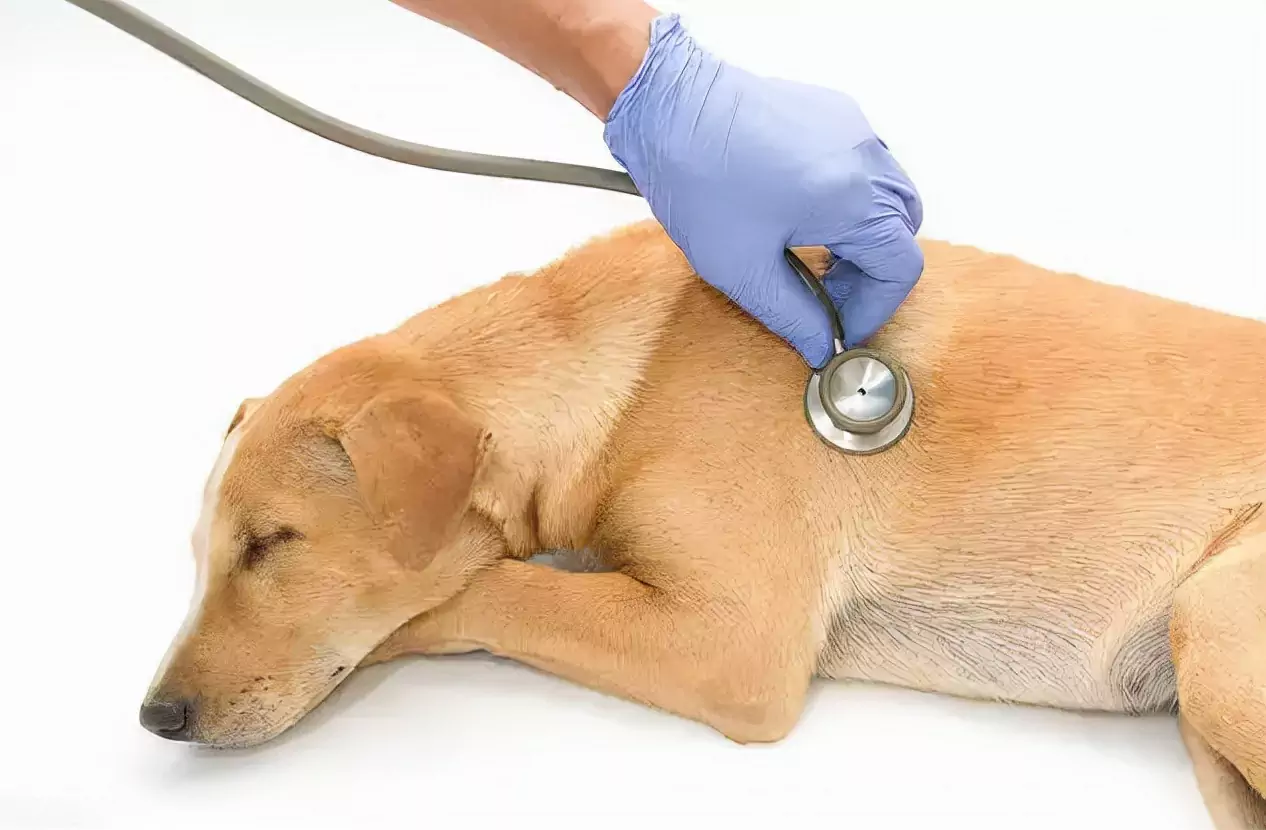What causes heart disease in dogs
2022-08-04
I. Analysis of the causes, symptoms, and countermeasures of heart disease in dogs
"Can dogs get heart disease too?" The question of a human medical shoveler still echoes in my ears; the answer is yes, dogs can also suffer from heart disease, just like us humans; according to the relevant data in the United States, nearly 7.8 million dogs in the United States suffer from heart disease, which means that about 10% of dogs in the United States suffer from heart disease (heart disease is also a highly prevalent disease in dogs in China), so the health impact of heart disease on dogs is still The impact of heart disease on the health of dogs is very significant.
Heart disease in dogs is almost as common as in humans, but unlike humans, smoking and a high-fat diet are not the biggest risk factors for heart disease in dogs. According to the data, cardiovascular disease in dogs is one of the top three causes of death in dogs, especially now that the number of urban dog owners is gradually increasing, especially for small dogs, such as poodles, bears, teacups, etc. are the most prevalent groups of heart disease.
Common heart diseases in dogs include parasitic infections (mainly heartworm), dilated cardiomyopathy, heart valve disease, congenital heart disease, etc. But for dogs, the heart disease that affects them the most and the most common heart disease is heart valve disease, this type of heart disease mainly affects small dogs over five years old, heart valve disease accounts for 70-75% of heart disease in dogs, and is also Heart valve disease accounts for 70-75% of heart disease in dogs and is a common example of heart disease in veterinary practice; heartworm infection also accounts for 13% of heart disease in dogs, but this type is completely preventable; heart muscle disease, such as dilated cardiomyopathy, accounts for 8% of heart disease in dogs and this type of heart disease mainly affects large dogs of all ages.
So, in this issue, Dr. Meow will share with you about heart disease in dogs. The main content of this issue includes four aspects: what is heart disease in dogs, analysis of the causes of heart disease in dogs, symptoms, and countermeasures.
Canine heart disease
The heart is the most important organ in the dog's body, its main role is to pump blood containing oxygen and nutrients through the blood vessels to the body's cells, so that the normal operation of the body's organs; when a dog suffers from heart disease, the effective amount of blood pumped by the dog's heart will gradually decrease, which may lead to the dog's chest or abdomen fluid; there are two main types of heart disease in dogs: one mainly affects the heart valves and the other primarily affects the heart muscle; either type can be successfully treated or prolonged in dogs with nutrition, proper exercise and medication as necessary.
Heart disease is also a progressive disease and may be a continuous process during the dog's illness, meaning that the affected dog will not show obvious symptoms if not stimulated during the illness, but over time, without timely treatment, the condition will deteriorate and thus will show obvious symptoms. A mild heart attack can be controlled with medication, while a serious heart attack may endanger the dog's life.
The causes, symptoms, and countermeasures of heart disease in dogs are analyzed!
Clinical symptoms of heart disease in dogs
As with many progressive diseases, the clinical symptoms of heart disease in dogs depend on the type and severity of the heart disease, and it is important to note that dogs with heart disease may not show any symptoms in the early stages of the disease, but as the heart disease progresses to congestive heart failure, when the heart cannot meet the body's needs, or when the dog has exercised vigorously, the dog will show more obvious symptoms, such as fatigue easily, reluctance or severely reduced willingness to be active, loss of appetite, weight accumulation loss, bloated abdomen, lethargy, and coughing.
Causes of Heart Disease in Dogs and What to Do About It
The vast majority of cases in dogs are considered "acquired heart disease", which can be caused by trauma or infection, and are most common in middle-aged and older dogs.
Chronic heart valve disease, which is the most common type of heart disease in dogs, is also known as "atrioventricular valve insufficiency" or "mitral heart valve disease".
As the name implies, this type of heart disease affects one or more heart valves; the heart valves in dogs usually close with a perfect seal, however, in dogs with heart valve disease, one or more of these valves "leak" and then allow blood to pump backward, and this backward flow of blood produces a murmur in the heart that can be heard with a stethoscope.
There are no specific medications for this type of heart disease, but medications can be used to slow the progression of the disease, however, in most cases, the main goal of medication is to control congestive heart failure in dogs.
2, dilated cardiomyopathy, by definition, dilated cardiomyopathy in dogs (DCM) is a disease of the dog's heart muscle, in dogs suffering from dilated cardiomyopathy, the dog's heart will not be able to effectively and normally contract, which will lead to the heart can not properly pump blood to all organs of the body.
The most common cause of dilated cardiomyopathy in dogs is a genetic mutation, so the diagnosis of this disease usually requires screening for dogs at high risk of this type of heart disease, which is common in older dogs. In addition to breed-related causes of dilated cardiomyopathy, diet, medications, and infectious diseases may also cause dilated cardiomyopathy in dogs.
If DCM is not treated promptly, it may lead to congestive heart failure. When congestive failure occurs in dogs due to DCM, dogs may experience reduced exercise capacity, fatigue, increased respiratory rate, excessive panting, and coughing. Sudden weakness, fainting, and even sudden death can occur; some dogs with DCM may experience abdominal enlargement and respiratory distress due to abdominal or pleural effusion.
In dilated cardiomyopathy, the progression of changes leading to hemorrhagic heart failure can be slowed by enalapril or other ACE (angiotensin-converting enzyme) agents (benazepril, lisinopril, etc.), and can be supplemented by other drugs; treatment is always tailored to the condition of the affected dog, and because the disease is irreversible and heart failure is often progressive, The intensity of treatment must usually increase or decrease with time and condition.
3, canine pericardial disease, the pericardium is the membrane wrapped around the dog's heart, it has two main layers: the thin inner layer adheres to the top of the heart muscle; the thicker outer layer is fibrous wrapped around the heart, forming a tougher sac, the space between the two layers is called the "pericardial space", in the middle of the two layers will usually contain a small amount of fluid if more fluid accumulates in the pericardium. If more fluid accumulates in the pericardial space, it can interfere with the normal pumping function of the heart, which can lead to heart disease in dogs.
Pericardial disease can occur in any dog, but is more common in large breeds, especially Golden Retrievers, and is often associated with cancer in dogs, but is a relatively uncommon heart condition.
When enough fluid accumulates in the pericardium, the dog's abdomen may become very swollen, which tends to happen relatively quickly; in addition, the dog may show typical signs of heart disease such as lethargy and weakness.
The first step in the treatment of this disease is to remove the fluid from the pericardial sac as soon as possible, and diuretics may be needed to remove the fluid that has accumulated in the dog's abdomen; if necessary, surgery may be required, and care should be taken to prevent secondary infections, such as inflammation, during the treatment process.

4. Heart failure (CHF) occurs when the heart is unable to deliver enough blood to the body and the fluid, therefore, flows back into the dog's lungs or abdomen; there are many causes of CHF in dogs, such as high blood pressure, heartworm, pericardial disease, and worsening heart valve disease, but it is most commonly caused by worsening chronic heart valve disease. Depending on the underlying cause of heart failure in dogs, treatment can help reverse congestive heart failure, and medications can be used to relieve symptoms.
When a sick dog's heart is unable to pump enough blood, the body can usually compensate additionally to ensure the blood and oxygen needed by organ tissues, but as the severity of the disease increases, the body's compensation mechanisms will become overwhelmed and the hearts will then be unable to pump enough blood into the body, so the blood will flow back, often into the lungs, causing the dog's lungs to become congested, hence the term "congestive heart failure".
Treating a sick dog usually requires finding the cause that triggers the disease, getting to the root of the problem, and then developing a treatment plan through the dog's actual condition. During treatment, the dog's heart should also be monitored to change the treatment plan at any time.
In addition, heartworms, congenital heart defects, and high blood pressure can cause heart disease in dogs, and breed and age can also cause heart disease in dogs.
Diagnosing Heart Disease in Dogs
In addition to diagnosis through history and clinical signs, other tests are needed to find the cause and confirm the diagnosis.
Auscultation with a stethoscope is the first step in checking whether your dog has heart disease. Auscultation can detect heart murmurs, and the location and intensity of the murmur, which is important to help with diagnosis.
Palpation or auscultation observes the dog's heart rate and pulse status for normalcy.
A chest x-ray is performed to assess the size of the heart and the abnormal state of the heart such as its shape and to look for lung lesions such as the presence of fluid.
Performing blood and urine tests that can show if the dog has other underlying conditions, such as a dog with heart disease that may also have kidney damage.
An electrocardiogram evaluates and detects any abnormal rhythms of the heart, such as arrhythmias.
A cardiac ultrasound, which uses ultrasound to examine the heart, can effectively assess the size and thickness of each ventricle in a sick dog and can directly observe the effectiveness of the dog's heart contractions, as well as take measurements of the heart to assess the pumping efficiency of the heart, which can be important in helping to diagnose heart disease.
In summary, regardless of the cause of heart disease in dogs, the most important thing is to find the cause of the disease, and only by finding the root can we treat the root cause. There are no specific drugs or measures to prevent heart disease in dogs, only early diagnosis and timely treatment; however, you can reduce the incidence of heart disease in dogs by giving them a proper diet, preventing obesity, and exercising them properly. (Note: Heartworm can be prevented by preventing the disease in dogs)
Was this article helpful to you?
Other links in this article
English:
What causes heart disease in dogs
Nederlands:
Wat veroorzaakt hartziekten bij honden
Polskie:
Co powoduje choroby serca u psów
Português:
O que causa doenças cardíacas em cães
português (Brasil):
O que causa doenças cardíacas em cães
русский:
Что вызывает болезни сердца у собак
日本語:
犬の心臓病の原因とは
中文简体:
是什么引起了狗的心脏病
中文繁体:
是什么引起了狗的心臟病
Comments

Why is my dog throwing up?

Why does my dog keep coughing?

How many months is a dog pregnant? Signs and Phenomena of Dog Pregnancy

How do dogs grow fleas? Ways to get rid of fleas on dogs

Can dogs get diabetes?

Can dogs be depressed?

Why does my dog keep sneezing? Causes of Sneezing in Dogs

Can dogs catch a cold? Cold and Flu Symptoms in Dogs

What causes heart disease in dogs

Can dogs get urinary tract infections?








